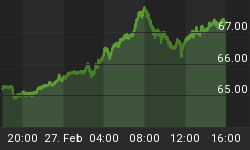When inexplicable events perplexed our early forbears, village wise men concocted elaborate and colorful explanations to soothe the populace. Earthquakes, hailstorms, and solar eclipses were all ascribed to root causes that made sense to the villagers and increased the esteem of the story tellers. The recent, unexpected surge of the U.S. dollar has led many Wall Street witch doctors to conjure a series of logic-defying tales to give reason to what is surely the random scramble of a confused herd. Wall Street spun similar yarns during the dot.com and real estate bubbles as investors groped for reasons to justify sky high prices.
The recent surge, which has pushed the dollar up more than 30% against some currencies in recent months, is purely a short-term technical phenomenon. The move is caused by global investment deleveraging, in which major financial players are reversing (unwinding) risky trades and piling into what is erroneously perceived as the safest haven they can find. Increasingly, foreign assets, many of which had appreciated more than American assets, have been sold, and the proceeds stashed into U.S. Treasury bonds, which these investors believe to be the Fort Knox of finance. The cascade has caused momentum trades, margin calls, redemptions, and other factors having nothing to do with the underlying fundamentals of the dollar or the U.S. economy. In fact, all that has happened to the U.S. economy, and all that the government has done, and is likely to do, in their misguided attempts to contain the damage, is extremely bearish for the U.S. dollar.
Mesmerized by technical moves and oblivious as always to the fundamentals, the Wall Street brain trust has offered flimsy explanations. One popular rationale is that as bad as things are in the United States, they are even worse every place else. Still another is that since the U.S. was the first country into the crisis that we will be the first nation to come out. Still another is that since our government is acting more boldly than most to tackle the problems, our economy will not suffer as badly as others where governments have been slower to react and more timid in their responses. In addition, many still perceive the United States as the citadel of stability in a world of second-rate economies.
However, if we look beyond these "explanations," the fundamentals loom simple and irrefutable: American borrowers of all stripes cannot afford to repay the trillions of dollars we owe. Over the past decade, the vast majority of lending has come from abroad, and as Americans don't pay, the losses show up on foreign balance sheets. Since we blew most of the money we borrowed on consumption, we simply lack the industrial capacity to repay our debts without resorting to a printing press.
In bankruptcy, both the debtor and creditors are affected. However, while creditors take a financial hit, ramifications for debtors are typically more severe. Creditors are generally better prepared to absorb their losses. However, for bankrupt debtors usually much more substantial changes ensue.
Since America is the world's biggest debtor, with our IOU's broadly held by every creditor nation, the effects of our bankruptcy are being felt worldwide. However, while our creditors are suffering now, their pain will be temporary and relatively mild compared to what awaits Americans.
So while it may appear to some that things are worse abroad, that is only because the full extent of our problems has yet to be reckoned with. The main lesson our creditors will learn from this crisis is not to lend American consumers any more money. Once the lending stops, our "cart before the horse" borrow to spend economy will crumble. While the rest of the world absorbs their losses and moves on, we will be digging our way out of the rubble for years to come.
Earthquakes are caused by the fundamental shifts of tectonic plates beneath the Earth's surface. A similar move is underway in the global economy. Describing either event without a basic understanding of either geology or economics will simply result in a tale being told by an idiot.
For a more in depth analysis of our financial problems and the inherent dangers they pose for the U.S. economy and U.S. dollar denominated investments, read my just released book "The Little Book of Bull Moves in Bear Markets." Click here to order your copy now.
For an updated look at my investment strategy order a copy of my new book "Crash Proof: How to Profit from the Coming Economic Collapse." Click here to order a copy today.
More importantly, don't wait for reality to set in. Protect your wealth and preserve your purchasing power before it's too late. Discover the best way to buy gold at www.goldyoucanfold.com. Download my free Special Report, "The Powerful Case for Investing in Foreign Securities" at www.researchreportone.com. Subscribe to my free, on-line investment newsletter, "The Global Investor" at http://www.europac.net/newsletter/newsletter.asp.















